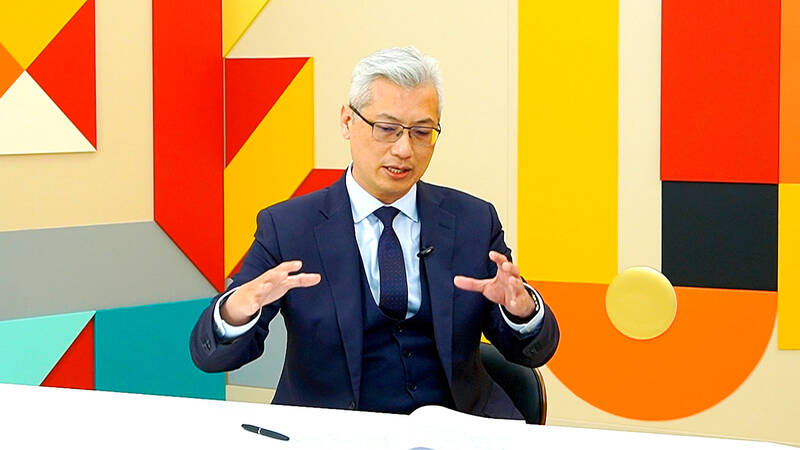The development of Taiwan’s wind power competitiveness should be on par with international standards following a 10-year policy that began in 2017, Ministry of Economic Affairs Industrial Development Administration Deputy Director-General Tsou Yu-hsin (鄒宇新) said.
Tsou made the remarks in an interview with the Liberty Times (sister paper of the Taipei Times) on Friday, citing government policies to support efforts to localize the wind power generation production chain since 2017, which are divided into three five-year stages.
Tsou said that localizing the production of wind power components would help the government attain its goals of using more green energy and developing Taiwanese green industries.

Photo: Liao Chia-ning, Taipei Times
We did not want to just import all equipment from the EU or other countries, which led to the decision to grow Taiwan’s green power generation and our industry, he added.
The government also wanted to expand Taiwan’s energy resilience, as fostering domestic production capabilities would ensure that repairs and maintenance would be less costly and more efficient, Tsou said.
Imagine if components had to be manufactured and shipped to Taiwan from abroad, the downtime — anywhere between three months to a year — would make Taiwan’s power generation less capable, he said.
The first five-year stage was dubbed the learning stage, during which the government inventoried domestic capabilities and isolated 20 items that Taiwan could manufacture domestically while matching international standards in terms of quality, price and speed, he said.
The initial stage was understandably challenging, because companies were expected to invest significant capital, introduce new technologies and train personnel to operate equipment, Tsou said.
The end product was expected to be compatible with international standards and immediately usable by wind power generation units, he said.
However, the government’s expectations that domestic companies would be able to completely manufacture all 20 items domestically within the first five-years were ultimately dashed, which made the second five-year stage — the “growing” stage — even more critical, Tsou said.
The nation has now entered the first and second phases of the third stage of wind power block development projects, he said.
During these projects, companies have been asked to grow their production capabilities and reduce overheads for production, with the expectation that by the conclusion of the “growing” stage, domestic companies would be able to meet international standards in terms of tech, quality, price and delivery times, Tsou said.
The third five-year stage, the “mature” stage, is to coincide with the 3-3 stage of wind power block development, which is the point at which government support would be gradually withdrawn, and the companies would be expected to establish their footing, not only in Asia, but also on the international stage, he said.

Taiwan has received more than US$70 million in royalties as of the end of last year from developing the F-16V jet as countries worldwide purchase or upgrade to this popular model, government and military officials said on Saturday. Taiwan funded the development of the F-16V jet and ended up the sole investor as other countries withdrew from the program. Now the F-16V is increasingly popular and countries must pay Taiwan a percentage in royalties when they purchase new F-16V aircraft or upgrade older F-16 models. The next five years are expected to be the peak for these royalties, with Taiwan potentially earning

STAY IN YOUR LANE: As the US and Israel attack Iran, the ministry has warned China not to overstep by including Taiwanese citizens in its evacuation orders The Ministry of Foreign Affairs (MOFA) yesterday rebuked a statement by China’s embassy in Israel that it would evacuate Taiwanese holders of Chinese travel documents from Israel amid the latter’s escalating conflict with Iran. Tensions have risen across the Middle East in the wake of US and Israeli airstrikes on Iran beginning Saturday. China subsequently issued an evacuation notice for its citizens. In a news release, the Chinese embassy in Israel said holders of “Taiwan compatriot permits (台胞證)” issued to Taiwanese nationals by Chinese authorities for travel to China — could register for evacuation to Egypt. In Taipei, the ministry yesterday said Taiwan

Taiwan is awaiting official notification from the US regarding the status of the Agreement on Reciprocal Trade (ART) after the US Supreme Court ruled US President Donald Trump's global tariffs unconstitutional. Speaking to reporters before a legislative hearing today, Premier Cho Jung-tai (卓榮泰) said that Taiwan's negotiation team remains focused on ensuring that the bilateral trade deal remains intact despite the legal challenge to Trump's tariff policy. "The US has pledged to notify its trade partners once the subsequent administrative and legal processes are finalized, and that certainly includes Taiwan," Cho said when asked about opposition parties’ doubts that the ART was

If China chose to invade Taiwan tomorrow, it would only have to sever three undersea fiber-optic cable clusters to cause a data blackout, Jason Hsu (許毓仁), a senior fellow at the Hudson Institute and former Chinese Nationalist Party (KMT) legislator, told a US security panel yesterday. In a Taiwan contingency, cable disruption would be one of the earliest preinvasion actions and the signal that escalation had begun, he said, adding that Taiwan’s current cable repair capabilities are insufficient. The US-China Economic and Security Review Commission (USCC) yesterday held a hearing on US-China Competition Under the Sea, with Hsu speaking on